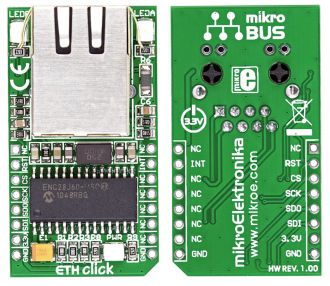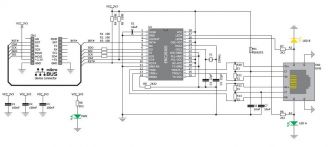
We strongly encourage users to use Package manager for sharing their code on Libstock website, because it boosts your efficiency and leaves the end user with no room for error. [more info]

Rating:
Author: MIKROE
Last Updated: 2019-07-30
Package Version: 1.0.0.1
mikroSDK Library: 1.0.0.0
Category: Ethernet
Downloaded: 20457 times
Followed by: 1 user
License: MIT license
Example shows how to use the ENC28J60:<br/>
the board will reply to ARP & ICMP echo requests<br/>
the board will reply to UDP requests on any port :<br/>
returns the request in upper char with a header made of remote host IP & port number<br/>
Do you want to subscribe in order to receive notifications regarding "ETH click" changes.
Do you want to unsubscribe in order to stop receiving notifications regarding "ETH click" changes.
Do you want to report abuse regarding "ETH click".

Front and back view of ETH click board designed in mikroBUS form factor. mikroBUS is specially designed pinout standard with SPI, I2C, Analog, UART, Interrupt, PWM, Reset and Power supply pins.
View full imageLibrary Description
The library covers necessary functions for the usage of the ETH Click board.
It allows user to enable, disable and reset the device, also, user can check the interrupt state.
Key functions:
uint8_t eth_checkInrerrupt() - Function checks the state of the interrupt pin.void eth_reset() - Function is used to reset the device.void eth_enable() - Function is used to enable the device.Examples description
The application is composed of three sections :
void applicationTask()
{
SPI_Ethernet_doPacket();
}
Additional Functions :
Other mikroE Libraries used in the example:
Additional notes and informations
Depending on the development board you are using, you may need USB UART click, USB UART 2 click or RS232 click to connect to your PC, for development systems with no UART to USB interface available on the board. The terminal available in all MikroElektronika compilers, or any other terminal application of your choice, can be used to read the message.
